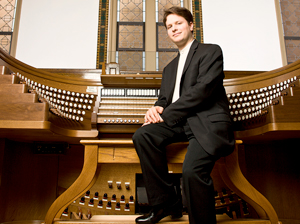by Daniel Hathaway

And in a first-ever occurrence, New York organ virtuoso Paul Jacobs will have the Severance Hall stage all to himself for the first half of the concerts on Saturday, February 21 at 8 and Sunday, February 22 at 3. Jacobs will “open” for the Orchestra with selections from the organ music of Brahms and Johann Sebastian Bach, played on Severance Hall’s 94-rank Norton Memorial Organ, built in Boston by the Ernest M. Skinner Co. in 1931, and restored and relocated by Ohio’s Schantz Organ Co. during the recent Severance Hall renovation.
The organs of major symphony orchestra halls are frequent ports of call for Jacobs, but usually for solo recitals, not for a concert shared between organ and orchestral music. “This is an unusual event, to be sure,” Jacobs said in a telephone conversation from his office at the Juilliard School in New York. “I’ll be playing with The Cleveland Orchestra, but not actually with them. But what an extraordinary way to introduce the audience to the beautiful E.M. Skinner organ at Severance. I’m thrilled that this repertoire is going to be included.”
How did this all come about? “The idea was to offer something unusual that would be well-suited to the music of Brahms,” Jacobs said. “Many Brahms lovers are unfamiliar with the composer’s interest in the organ. While he didn’t leave a large body of organ music to posterity, the music that he did leave is worth hearing.”
That small corpus of organ music began with preludes and fugues and smaller works written early in Brahms’s career when he was learning the art of counterpoint. Jacobs will begin his half of the program with the Prelude and Fugue in g minor. “The preludes and fugues are early, but they certainly feature his stylistic sensitivities. Brahms expressed a keen interest in the music of the past. He took old forms and impressed upon them his own rich harmonic language and his thoroughly worked-out counterpoint.”
At the other end of Brahms’s life came the opus 122 Chorale Preludes, eleven eloquent settings of Lutheran hymns. Jacobs will play two of those pieces, O wie selig seid ihr doch, and Es ist ein Ros’ entrprungen. “I think these two will translate well to the lush tonal palette of the Skinner organ. We know that Es ist ein Ros’ was one of Brahms’s favorite pieces of music,” Jacobs said. “I read somewhere that every time he passed by a piano, he sat down and played this piece.”
Audiences at Severance Hall will have to listen closely to that chorale prelude to discern the tune — best known today as Lo, how a rose e’re blooming. The composer has embellished it to the point where the tune is heard almost subliminally. “Of the infinite number of chorale melodies that were sung by the congregation throughout the centuries, this is certainly one that has endured,” Jacobs said.
Jacobs will end his “set” with Johann Sebastian Bach’s virtuosic Prelude and Fugue in a minor, BWV 543. Why include Bach? “In the time available, it made sense to offer a sample of Brahms the organist and to join his music with the music of Bach, who is the Alpha and Omega of music,” Jacobs said. “Certainly Bach casts his shadow heavily on Brahms — and on everyone else, for that matter.
“I believe the Bach piece also pairs nicely with Brahms in that it has a tremendous sense of flair. Choosing a prelude and fugue composed during his Weimar years rather than a later piece that’s wonderful but more cerebral might not capture everyone’s attention. We want the audience to become captivated by organ music, and I believe that this prelude and fugue does that very effectively and immediately.”
Paul Jacobs hopes that his cameo appearance at Severance Hall will make an impact in a short period of time. “We only get one crack this weekend at making some friends for the organ,” Jacobs said, “and my guess is that many members of the audience haven’t heard this instrument, and certainly not in a solo capacity. We hope that there will be an epiphany, at least among a few people!”
Fans of Paul Jacobs and of the great soprano Christine Brewer can look forward to the August release of their joint CD on the Naxos label, featuring solo organ pieces and works for voice and organ by J.S. Bach, Handel, Gounod, Boulanger, Puccini, Wolf and Reger. A recital tour next season will take Brewer and Jacobs to Spivey Hall in Georgia, the Basilica in St. Louis, Davies Symphony Hall in San Francisco, New York’s Lincoln Center, and Disney Hall in Los Angeles.
And next season, Paul Jacobs will perform with the orchestras of Lexington, KY, Indianapolis and Philadelphia, the Philadelphia Orchestra engagement to be led by James Levine.
Published on ClevelandClassical.com February 17, 2015.
Click here for a printable copy of this article


